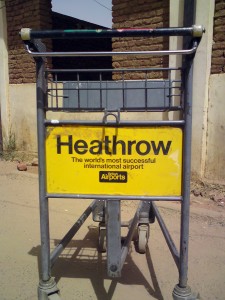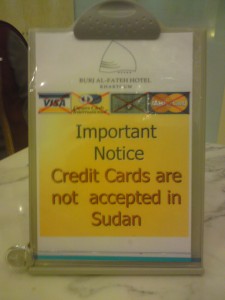Thanks Frank (Gardner)
It was he who encouraged me to blog about my experiences and I have always wanted to be able to share some of the techniques I’ve come to adopt when undertaking international assignments. The offer by Sandra Ward and Val Skelton, Co-Editors of Business Information Review, to write an article for the forthcoming edition was too good to miss and so today I submitted that piece.
Here are just a few snippets from my submission (the pictures won’t be appearing):
Abstract
In today’s global village the ability to work cross border and cross culture is increasingly important. This article looks at the lifecycle of an assignment from winning and negotiating to working and collaborating concluding with reporting and getting paid. It examines what it takes to run successful international assignments while identifying a number of potential pitfalls to be avoided and issues to be considered.
 I am lucky; I’ve worked across five continents and experienced many different cultures over the last 40 years. I’ve been shot at in Ireland, detained in Sudan, been part of an aid convoy in the Philippines after Typhoon Ondoy, slept in a tin shack in Darfur, shared a room with a desert rat while watching oil fields burning in Saudi Arabia in the aftermath of Desert Storm and landed in Barbados after the island’s only hurricane.
I am lucky; I’ve worked across five continents and experienced many different cultures over the last 40 years. I’ve been shot at in Ireland, detained in Sudan, been part of an aid convoy in the Philippines after Typhoon Ondoy, slept in a tin shack in Darfur, shared a room with a desert rat while watching oil fields burning in Saudi Arabia in the aftermath of Desert Storm and landed in Barbados after the island’s only hurricane.
When I reflect on a few snippets from a lifetime of conducting international assignments it’s perhaps unsurprising that my daughter frequently asks the question at the top of this piece.
Winning the business
We’ve all had ‘we’d like to invite you to tender for’ requests from organizations we’ve never met. As you become more visible and published so these increase. As a rule unless you can trace a direct link to someone you know or somewhere you’ve been then you are being used as padding for a tender process. Be warned. It takes a considerable effort to respond to tender requests especially when there are procurement specialists intermediating….
Negotiating the ‘deal’
….An African friend of mine signed up for a consulting engagement with one of Africa’s major organizations. It looked great and met all of the criteria outlined above. Payment was triggered by receipt and acceptance of a set of reports and recommendations. Now 9 months later he is still waiting for formal approval for his reports. His mistake? He had no milestone payment and no upfront mobilization fee. Next time he might insist on a payment for delivery with balance on acceptance.
Travelling and staying
… Before I decide on whether to go or not to a country I check out what and whom I know who might help – I conduct my own ‘Peer Assist’ – and visit the members’ library at Chatham House.
…Accommodation can make or break an assignment! A client will often give you an allowance or have preferential rates. Expensive doesn’t always mean good; proximity to your client is vital as is the ability to work in your room. For Darfur Victoria Ward and I had to undergo UN security training. It taught me a number of things I use today when asking for a room:
- Above tree line and below floor 7
- Preferably not facing the street
- Proximity to fire stairs.
Working & communicating
…The Culture Map which notes that human speech varies depending on whether there is a “high” or “low” level of assumed shared cultural context. This affects vocabularies: the English use more words whereas North Europeans (and Americans) tend to be more forthright.
Why is this relevant? If you don’t adapt your style and (in my case) speak slower, write more succinctly and with less jargon, there is huge potential for miscommunication….
Importance of set up
If the way we speak, write and hold ourselves is important so are the technological underpinnings. Consider this: in many organizations the jump drive (memory stick) is banned. There is a limit on email size (try sending a video to a client), browser activity is monitored and restricted and guest access behind their firewall requires countless sign off and takes days!….
Listening ears and noticing eyes
How you are received on arrival is usually a good indicator of how important your visit is…
…I also find it pays to listen more than talk especially in the early parts of an assignment, as someone once said ‘you have two ears and one mouth and should use them in that proportion’…
Friendly ‘fire’
Assuming you are by now super observant and minding your P’s & Q’s, the next big challenge facing you is how to work with your immediate stakeholder group. You need to establish separate sounding boards not just your project sponsor…
Handling left field moments
Even the best of us can inadvertently put a metaphorical foot wrong. Our actions are magnified when we are dealing in a different environment and out of our comfort zones….
…Perhaps my most surreal experience occurred in Sudan when I was invited to visit a major company for a discussion only to find on arrival there were 200 people assembled to hear my presentation on ‘Knowledge Management in the Energy Industry’. After recovering from the shock I conducted a 45-minute Q&A session prompted by an opening, ‘What keeps you awake at night?’
Reporting and getting paid
I’ve had mainly positive experiences dealing with international clients and getting paid. Typically the more ‘developed’ the country the worse organizations (especially governments) are at making payment if you are an SME.
However I’ve found people will try and find a way to pay you if they feel you’ve done a good job. Your challenge is to manage that perception!…..
Ten tips
If I were advising someone about to undertake their first international assignment what would I tell them?
 Clarity is key, ambiguity is the enemy of progress: be clear about the terms, what they are going to get, when and in what format and what help and assistance you need from them in order to deliver it.
Clarity is key, ambiguity is the enemy of progress: be clear about the terms, what they are going to get, when and in what format and what help and assistance you need from them in order to deliver it.- Prepare for the unexpected: plan for disasters and have a backup (if you are on medication take that in your briefcase); save your work to the cloud (securely of course). Adopt my 50/50/50 rule and always have that amount of £, € and $ in your wallet.
- Keep detailed field notes and conduct regular After Action Reviews or Pause & Reflect sessions as a team: It’s vital to be able to reflect on what you’ve heard and to have the ability to play that back in regular progress reports.
I will share the rest of the article and the remaining seven tips over the coming months.
